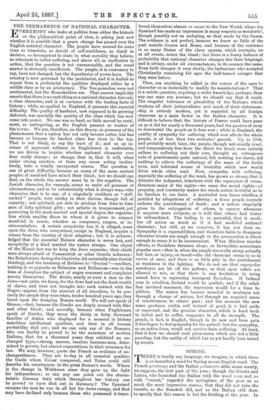SPRING.
rrHERE is hardly any language, we imagine, in which there is so beautiful a word for Spring as our English word. The French printemps and the Italian primavera alike mean merely, we suppose, the first part of the year ; though the Greeks and Latins, who furnished the Italian with the word Vera, and us with "vernal," regarded the springtime of the year as so much the most impressive seasou, that they did not take the trouble, as the Sanskrit did, and as the Italian still does, to specify that this season is but the firstling of the year. In like manner, the German Frithling is nothing but "the early time." Only in English have we a word which notifies that it is the season of sprouting and budding, just as our old word for autumn, "the fall," notifies that it is the season of the fall of the leaf. It is curious that while the prosaic mind of Rome saw in autumn the season of " increase " (from a ugeo), though our own ancestors only saw in it the season of the leaf's fall, Rome did not see in the new life of springtime anything so characteristic as it discerned in the time of harvest. In our English phrase, we have ignored the gain of harvest, and thought only of the falling leaf, just as in Spring we have thought only of the breaking buds, so showing that our Saxon ancestors clung more to the imaginative im- pression made by the seasons than to the material benefits they brought. There is something singularly fascinating in the name they gave to the season of buds and shoots, some- thing, too, which is equally expressive of the emotion which it excites in the mind, the sense of new vitality, of new growth, of new motion,—nay, perhaps of the springing of new fountains of feeling, for the only thing missing to the beauty of a dry Spring like the present, is the failure of this delicious sense of soft springing waters. Usually, Spring is the season in which not only the trees put forth buds, but the melting snows and past rains begin to refresh the soil with a bubbling moisture that does not chill it. And yet perhaps the greatest delight of Spring, in a climate like ours, is the early morning light, while everything is still quiet,—the sunshine that is neither hot nor a summons to be stirring, but which brings with it the liquid note of the blackbird and the eager jubilation of the thrush, without even rousing us into wakefulness. In England, no one feels the sense of Spring so delightfully as he does on the dawn of an April day, when the sun comes neither so early as to wake him from still more welcome rest, nor so late as to make him conscious that the work of the day has begun. There is a sense of wonder and freshness and hope in the early dawn of a Spring day, which hardly anything else in the whole year can awaken in us. Is there anywhere so vivid an experience in life as the gratefulness of early sunshine to the eye un- closing out of sleep, and suddenly become aware that another night is gone ? The springing light is even more of a miracle than the springing water or the springing leaf, a miracle of higher meaning. There is more in us which springs into answering life, in response to the early April sunshine, than is roused by any other characteristic of the season, however fresh. Even the cry of the dying poet was for "more light," though what he really needed was more vision,—in a word, more life. But that is the characteristic of light, and most of all its characteristic when it is winning a victory over darkness, when it is gaining ground on recent gloom, that it presents itself to us as the symbol of our own buoyancy, of our own vividness,— in short, to use our own beautiful and unique word, of our own Spring.
And yet, though the loveliness of the early Spring light is perhaps the most characteristic of all the features of the season, of course a great part of the associations which give it that love- liness is due to the knowledge which we have then, and then only, that the barrenness of the earth to which our eyes have been so long accustomed is going, that the brown trees are beginning to put on a new tinge of breaking buds, the larches to show a faint flush of green, the daffodils and primroses to burst into flower, the currant and the almond trees to blossom,—and, in short, that the dried-up fields and bare outlines of branch and twig, of which, delicate and beautiful as they are, the eye was getting weary, are all showing that they have not lost the power to spring. It is, after all, not the youth of the earth, but its youth in age which gives the sense of wonder and strangeness to the Spring,—the old, decrepit trees, eaten out till they are mere skeletons of their former selves, that touch us by the delicacy of the young leaves which break from the mere shell that remains of them,—the contrast between the dark-brown arms of the pyrus and the continuous line of crimson blossoms which give it so strange a glory,—the dusky ground of the fields from which the tender green of the oats or wheat is jest showing itself, while the lark springs into the air from amongst the furrows. Tennyson makes "tears, idle tears, rise in the heart and gather in the eyes, in gazing on the happy autumn fields ;" but is there not a greater pathos still in gazing on the fields in Spring, when so much that is barren is returning to life ; and when for that very reason, the mind tries to measure the remaining force of its own buoyancy, and is drawn towards the sources of a deeper and more vivifying Spring P Without the constant reminder of the winter that is passing away, the beauty of the Spring would be quite im- perfect; and without hints here and there of a winter that will not pass away, of trees that will never break into bud again, without melancholy gaps in the hawthorn or holly hedge where some of the stocks have died, without patches of gene which the fire has seared without burning away, and great knots of ivy on which no leaf will ever grow, we should hardly feel the full pathos of the Spring as the old at least certainly feel it, as well as the more vigilant among the young. The delight of Spring is half due to wonder that there is so much power to spring left in the earth, and is therefore half-interroga- tive,—half a question how much Spring is left in us as we are, and how much depends on a renewal of which we feel vividly the need, and perhaps the prophecy. Is the burden that we feel only that which the poet felt because he had the sensitiveness of youth, because "the heavy and the weary weight of all this unintelligible world" strained every throbbing nerve in him P or is it the burden which a man exhausted by illness feels when he tries to lift a finger,—the exhaustion of true weakness, not the bewilderment of redundant energy P For the most part, the charm of Spring consists in that faint sense of reviving power which answers, though it often answers doubtfully, the question as to the amount of buoyancy left in us. But, oddly enough, in the young, in whom this sense of reviving power is the strongest, Spring is much more often a melancholy season than with the old, —perhaps because the sense of life in the young is too impatient, too ambitious for its powers ; while in the old, the revival of strength, however partial, is not at all likely to issue in that deep discontent which Wordsworth describes as one of the most notable of the characteristics of his youth. The discontent of youth is certainly at its maximum in Spring, when the sense of vitality is more out of proportion to the sense of power than in any other season of the year, and overflows in straining after impossi- bilities. But in later age, the sense of vitality is often greatly inferior to the sense of power, and so it happens that while Spring is the favourite season of the old, Autumn is more often the favourite season of the young. To both alike, curiously enough, the season which brings the deepest sense of pathos is the favourite season. In youth, Autumn brings the deepest sense of transience to the mind, because there is so much beauty, and all the beauty is passing away. But to the old, it is Spring that brings that sense of pathos most deeply, because there is so much beauty, and all that beauty is coming back to the external world, but coming back with various threatenings and mutterings that to some it will not return again, or not return again in the forms in which we have learned to know and love it. With the young, the consciousness of loss is the saddest, though by no means the most disturbing emotion of the seasons. With the old, the consciousness of reviving life, but inadequately reviving life, delightful as it is, brings with it much more emphatic prophecy of the end, than the sense of loss itself. The diminishing elasticity of Spring is to them a much more significant symptom, than the deepening gloom of Autumn.



































 Previous page
Previous page